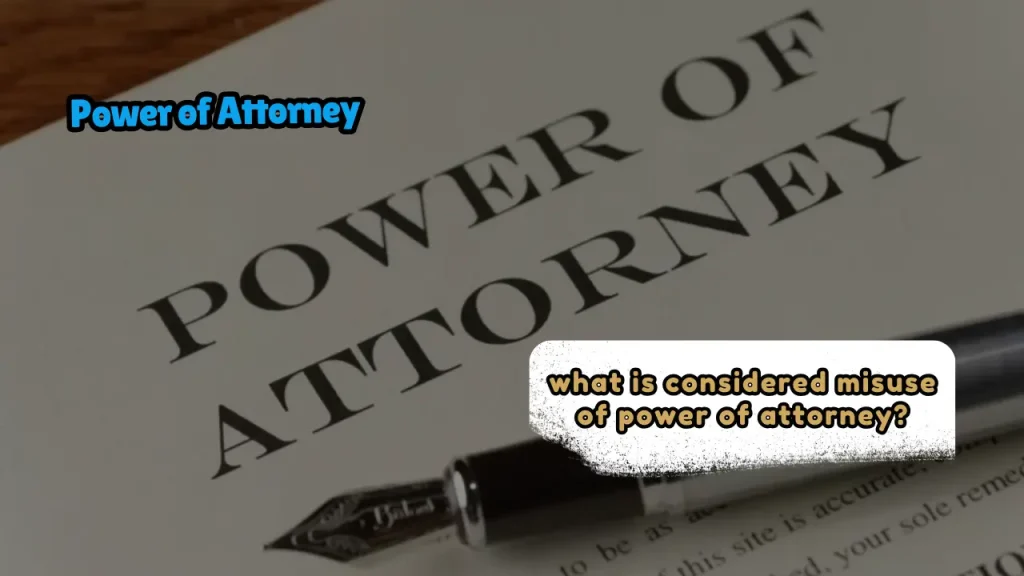Power of Attorney Abuse: How to Recognize, Prove, and Prevent Financial Exploitation
Misuse of power of attorney (POA) occurs when an agent exploits their authority to harm the principal’s finances, property, or well-being—often through theft, fraud, or unauthorized decisions. POA abuse affects 1 in 10 older Americans annually, costing victims an average of $120,000 (AARP, 2023). Here’s how to spot, prevent, and address this silent epidemic.
Table of Contents
Defining POA Misuse: Legal and Ethical Boundaries
A POA grants an agent (attorney-in-fact) the legal right to act on behalf of the principal. Misuse violates this fiduciary duty and includes:
- Financial Exploitation: Withdrawing funds for personal gain, selling property without consent, or overpaying oneself.
- Unauthorized Gifting: Transferring assets to themselves or others unless explicitly permitted in the POA.
- Neglect of Duties: Failing to pay bills, manage property, or provide care as required.
- Self-Dealing: Using the principal’s assets to secure loans, invest in personal ventures, or cover private expenses.
Legal Standard: Under the Uniform Power of Attorney Act (UPOAA), agents must act in the principal’s “best interest” and avoid conflicts of interest. Violations can lead to civil or criminal charges.
Common Types of POA Abuse
- Pocketing Funds
- Example: An agent withdraws $50,000 from the principal’s account for a “vacation home” without justification.
- Red Flag: Sudden large withdrawals or unexplained wire transfers.
- Forging Signatures
- Example: An agent refinances the principal’s home without consent, pocketing the equity.
- Red Flag: New loans or liens on property the principal didn’t approve.
- Isolating the Principal
- Example: Restricting family access to hide suspicious transactions.
- Red Flag: The agent becomes defensive or secretive about financial decisions.
- Manipulating Estate Plans
- Example: Changing beneficiaries on accounts or wills to include themselves.
- Red Flag: Unauthorized updates to estate documents.
Statistic: 67% of POA misuse cases involve family members, per the National Adult Protective Services Association (NAPSA).
Related article for you:
Can You Open a Bank Account for Someone with a Power of Attorney?

Legal Consequences of Misusing a POA
- Civil Penalties: Lawsuits for restitution, breach of fiduciary duty, or punitive damages.
- Criminal Charges: Theft, fraud, forgery, or elder abuse charges (felony in 46 states).
- Probate Court Intervention: A judge may revoke the POA, appoint a guardian, or freeze assets.
Case Study: In 2022, a California agent was sentenced to 5 years in prison for stealing $250,000 from her elderly mother, citing Penal Code §368(c) (financial elder abuse).
How to Spot POA Misuse
- Financial Red Flags:
- Unpaid bills despite sufficient funds.
- Missing jewelry, art, or valuables.
- Unusual credit card charges or new accounts.
- Behavioral Red Flags:
- The agent refuses to provide financial records.
- The principal appears fearful or confused about their finances.
Pro Tip: Request annual accountings from the agent, mandated in states like Florida (FL Statutes §709.2122).
Preventing POA Abuse: Proactive Strategies
- Limit the POA’s Scope:
- Use a limited POA for specific tasks (e.g., paying medical bills only).
- Ban gifting or self-compensation unless essential.
- Appoint a Monitor:
- Name a co-agent or require third-party oversight (e.g., an attorney reviews large transactions).
- Leverage Technology:
- Use tools like EverSafe to track account activity and receive fraud alerts.
- Choose Wisely:
- Avoid agents with debt, addiction, or a history of financial irresponsibility.
State-Specific Tip: Texas allows “springing” POAs that activate only upon incapacity, reducing preemptive abuse (Texas Estates Code §751.0021).
What to Do If You Suspect Misuse
- Gather Evidence: Bank statements, emails, and witness accounts.
- Report to Authorities:
- Adult Protective Services (APS) for elder abuse.
- State attorney general’s office or local police.
- File a Civil Lawsuit: Recover stolen assets via a probate court petition.
- Revoke the POA: Submit a written revocation to the agent and financial institutions.
Resource: National Elder Fraud Hotline: 1-833-FRAUD-11 (free counseling and reporting).
State Laws Addressing POA Misuse
- California: Financial elder abuse under Penal Code §368 carries up to 4 years in prison.
- New York: Agents must act “in good faith” (NY General Obligations Law §5-1501).
- Illinois: Requires agents to maintain detailed records (IL Power of Attorney Act).
SEO Keywords: “how to prove power of attorney abuse,” “state penalties for POA misuse,” “reporting financial exploitation by agent.
Resources for Victims
- Legal Aid:
- Legal Services Corporation (LSC) for low-cost attorneys.
- NAELA (National Academy of Elder Law Attorneys) for specialist referrals.
- Support Networks:
- AARP Fraud Watch Network.
- Elder Justice Initiative (DOJ program).
Final Takeaway
POA misuse is both a betrayal and a crime. Protect loved ones by drafting clear, limited POAs, monitoring agent activity, and acting swiftly if red flags arise. When in doubt, consult an elder law attorney to safeguard dignity and assets.
About the Author

Sarah Klein, JD, is an experienced estate planning attorney who has helped clients with wills, trusts, powers of attorney, and probate matters. At All About Lawyer, she simplifies complex estate laws so families can protect their assets, plan ahead, and avoid legal headaches during life’s most sensitive moments.
Read more about Sarah
